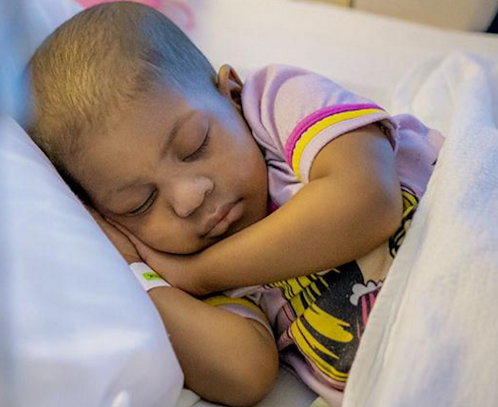|
|
Developmental Biology - Precision Medicine
Precision Medicine In Pediatric Cancer
Twenty percent of pediatric cancers arise in children who have a predisposition to malignancy through their genes...
Research performed over the last several decades has led to an increased understanding of the genetics of cancer. However, the clinical application of this knowledge has lagged behind cancer studies performed for adults.
In a perspectives article published in Science, Dr. Jaclyn Biegel, from Children's Hospital Los Angeles, and Dr. Alejandro Sweet-Cordero, of the University of California, San Francisco, have surveyed the landscape of this young field and present opportunities for using genomic information to advance a new era of care for children with cancer.
Cancer arises from genetic changes, including DNA mutations, that are either present at birth, or acquired over time. Many adult cancers are initiated by mutations acquired through exposure to substances like smoking and radiation or simply from aging.
Tumors may contain hundreds of sequence alterations. Identifying which changes drive the growth of the tumors, and impact treatment response can be challenging.
In contrast, pediatric malignancies often develop from a very small number of mutations, only some of which overlap with the types of mutations seen in adult cancers.
An estimated 20% of pediatric cancers arise in children who have a genetic predisposition to malignancy. For this reason, clinical genetic assays which inform prognosis and treatment decisions in adult cancers have not been as useful in pediatrics.
OncoKids® was one of the first next-generation sequencing panels to detect DNA and RNA changes that characterize pediatric cancers. The panel was developed at Children's Hospital Los Angeles under the guidance of author Jaclyn Biegel, PhD, FACMG, Director of CHLA's Center for Personalized Medicine. The OncoKids® panel provides a molecular diagnosis, informs prognosis, and highlights novel therapeutic targets across a broad spectrum of cancers in children, including leukemias, brain tumors and other solid tumors.
"To truly achieve personalized medicine in pediatric oncology, we need to be able to determine if a child is genetically predisposed to develop cancer."
Jaclyn A. Biegel PhD, FACMG; Chief of Genomic Medicine; Director, Center for Personalized Medicine (CPM); Professor of Pathology (Clinical Scholar), Keck School of Medicine of USC.
In addition to tumor testing, germline testing uses a sample of a patient's blood, critical in identifying those who have a genetic risk for developing cancer in the future. Besides benefiting the patient, this information has implications for the entire family, as an abnormality passed down from parent to child raises the risk of developing cancer in siblings.
Although tremendous progress has been made in pediatric cancer care, treatment resistant disease and relapse continue to negatively impact patient outcomes. Genetic profiling of pediatric cancers is typically done at the time of diagnosis or at the time of relapse to help determine new treatment planning. In the future, studies may be performed over the course of treatment — and at remission providing critical information about tumor progression, treatment resistance and metastasis, according to Dr. Biegel.
Tremendous opportunity exists for changing outcomes in children with cancer by using an integrated approach to evaluating children and their families that includes genomic medicine as a central component in their care.
Abstract
The past decade has witnessed a major increase in our understanding of the genetic underpinnings of childhood cancer. Genomic sequencing studies have highlighted key differences between pediatric and adult cancers. Whereas many adult cancers are characterized by a high number of somatic mutations, pediatric cancers typically have few somatic mutations but a higher prevalence of germline alterations in cancer predisposition genes. Also noteworthy is the remarkable heterogeneity in the types of genetic alterations that likely drive the growth of pediatric cancers, including copy number alterations, gene fusions, enhancer hijacking events, and chromoplexy. Because most studies have genetically profiled pediatric cancers only at diagnosis, the mechanisms underlying tumor progression, therapy resistance, and metastasis remain poorly understood. We discuss evidence that points to a need for more integrative approaches aimed at identifying driver events in pediatric cancers at both diagnosis and relapse. We also provide an overview of key aspects of germline predisposition for cancer in this age group.
Authors
E. Alejandro Sweet-Cordero1, Jaclyn A. Biegel.
The authors declare no conflict of interest.
Acknowledgements
Funding for this project was through the following institutions: NIH/National Institute of General Medical Sciences, Cure Alzheimer's Fund, Muscular Dystrophy Association, Genentech.
About Children's Hospital Los Angeles
Children's Hospital Los Angeles has been ranked the top children's hospital in California and sixth in the nation for clinical excellence by the prestigious U.S. News & World Report Honor Roll. The Saban Research Institute at CHLA is one of the largest and most productive pediatric research facilities in the United States. CHLA also is one of America's premier teaching hospitals through its affiliation since 1932 with the Keck School of Medicine of the University of Southern California. For more, visit CHLA.org, the child health blog and the research blog.
Return to top of page
| |
|
Mar 25 2019 Fetal Timeline Maternal Timeline News
 For many children with cancer, the future is bright. Thanks to treatment advances, the average cure rate in high-income countries now exceeds 80%. Collaborative research may yield new treatments with fewer side effects to help improve cure rates in lower-income countries.
|



